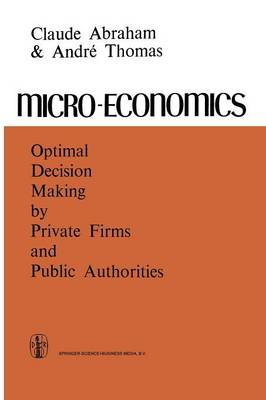The origin of this work is to be found in the cyclostyled course on 'The optimal allocation of resources in the firm and in the Nation' taught by Mr Boiteux at the Centre d'Etudes des Programmes Economiques (C. E. P. E. ), Paris from 1957 to 1960. Of course, several successive later rewritings and a great many additions have profoundly altered the initial version: starting from a remarkably clear and concise exposition of eco nomic theory, we have ended with a book that is several hundred pages long. It is not at all certain that Mr Boiteux would recognise this intellec tual sponsorship. Nor is it certain that the gain in information justifies such an increase in size. However that may be, the initial plan has survived. Without Mr Boiteux this book would never have been undertaken: it is a pleasant duty for us respectfully to acknowledge our debt to him here. Microeconomic analysis, that is to say that analysis which results from the study of the behaviour and activities of individual decision-units, was for a long time the main concern of the neo-classicists. Quite recently the introduction of macroeconomic theory, dealing with aggregate quan tities, seemed to relegate it to second place. But this is not where it belongs: we tend to agree with Mr Raymond Barre that there are "two different scales of analysis that complement rather than contrast with one another".
- ISBN13 9789401722698
- Publish Date 13 July 2013 (first published 31 December 1972)
- Publish Status Active
- Publish Country NL
- Imprint Springer
- Edition Softcover reprint of the original 1st ed. 1973
- Format Paperback
- Pages 507
- Language English
